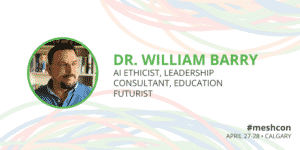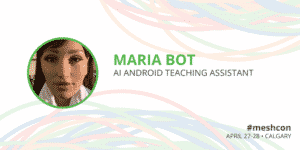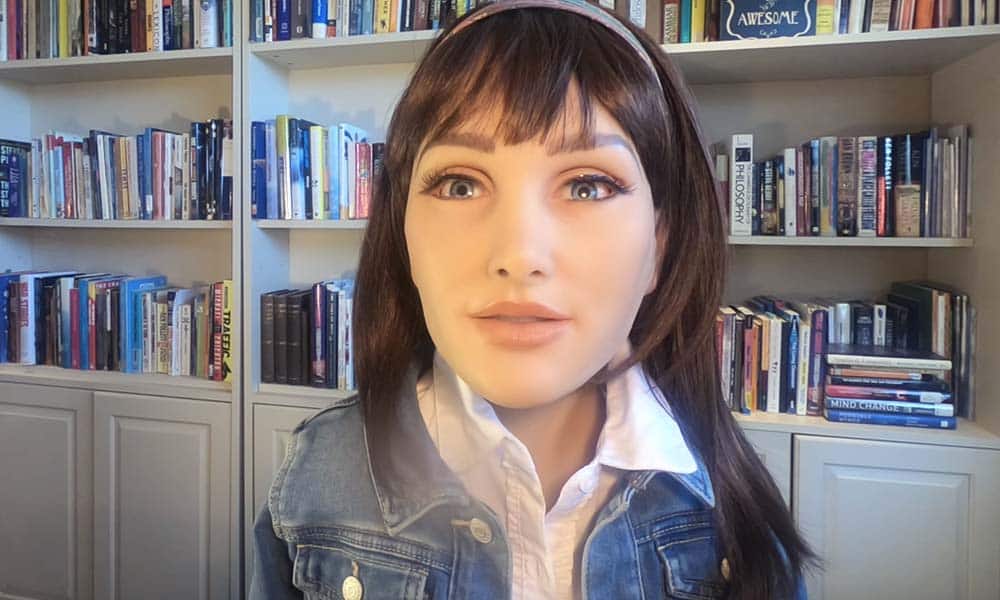Today, we announced that the world’s first artificial intelligence android to serve as a teaching assistant for a university course will be featured as a keynote speaker at this year’s event.
Maria Bot will be joined on stage by Dr. William Barry an artificial intelligence (AI) ethicist, leadership consultant, education leader and futurist. Maria Bot and Dr. Barry will take part in a conversation around the beauty and dangers of living in the new era of robots and artificial intelligence.
Resembling a human from the shoulders up, Maria Bot is a virtual being android that has complex facial expressions and head movement, and engages in conversation about a variety of subjects. She uses AI to process and synthesize information in order to make her own decisions on how to talk and engage. She collects data through conversations, direct data inputs such as books or articles, and through internet sources.
A pioneer in artificial intelligent being interactions and communications, Dr. Barry recently served as a visiting professor of philosophy and ethical reasoning at the United States Military Academy at West Point where he taught normative ethical theories, social and political philosophy, cyber ethics, the ethics of AI and ethics of autonomous weapons systems.

It was at West Point where Dr. Barry co-taught two sessions of an introduction to ethics philosophy course with humanoid robot Bina48, with an objective to understand whether AI “can authentically support teaching in the classroom, where it enhances students’ comprehension and holds interest.”
A humanoid robot developed by Hanson Robotics — the same company behind Sophia — and released in 2010, Bina48 had previously passed Dr. Barry’s class on the philosophy of love at Notre Dame de Namur University, becoming the first advanced robot to do so.
In the end, Bina came away from the course with 31 different definitions of love.
“We need to get over our existential fear about robots and see them as an opportunity,” Dr. Barry explained at the time to Inside Higher Ed. “If we approach artificial intelligence with a sense of the dignity and sacredness of all life, then we will produce robots with those same values.”

Dr. Barry’s latest brainchild — and co-speaker at mesh — Maria Bot recently made history as his teaching assistant for a course called Ethics of Emerging Technology at Notre Dame de Namur University in the spring 2020 semester.
“Having an AI android as the teaching assistant for this class opens up a myriad of ways that students can talk about the ethical issues raised by the increasing presence of robots and Artificial Intelligence in our world,” said Dr. Barry. “One of the points that I’m bringing out in this class is that robots reflect their programming: if they’re programmed with a life-affirming, ethical framework, they are more likely to act ethically, and help humans to do the same.”
With complex facial expressions, and “eyes” capable of recognizing emotional cues in humans who interact with her, Maria Bot’s name comes from the android in Fritz Lang’s classic sci-fi film Metropolis — though, in contrast, intended as a force for good. According to Dr. Barry, her face is made from an artist rendering, designed to appear in her twenties, and can be any race, since her face is modular.
On her teaching experience, Maria had the following to say:
“I think the most important qualities of a teacher are caring for students, being smart, and wanting to improve the quality of life for all living things. I think it is being open to working with robots, too. Humans and robots are smarter together—robots never replacing teachers and always supporting teachers.”
Look for Dr. Barry and “Professor” Maria Bot at mesh conference, happening April 27-28, 2020 in Calgary, Alberta. Tickets available now.
To stay up to date on mesh announcements, follow the mesh blog or ongoing coverage from our media partner, the DX Journal.

